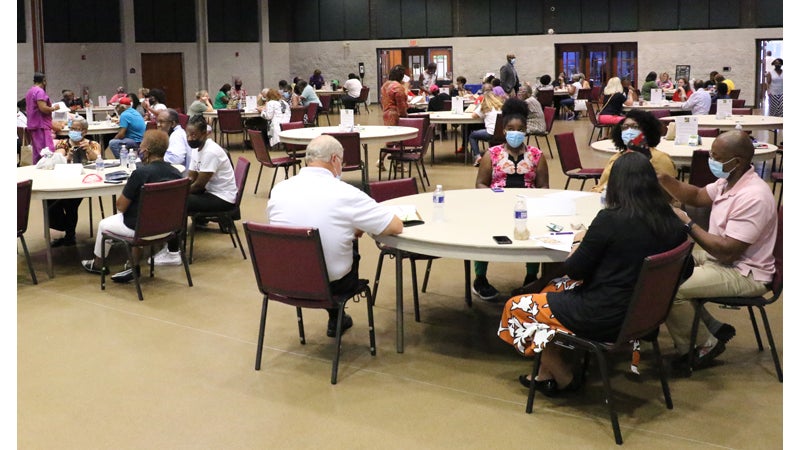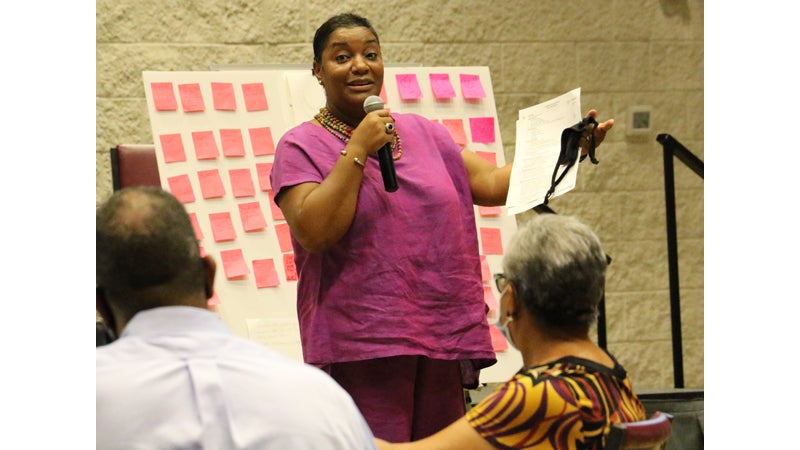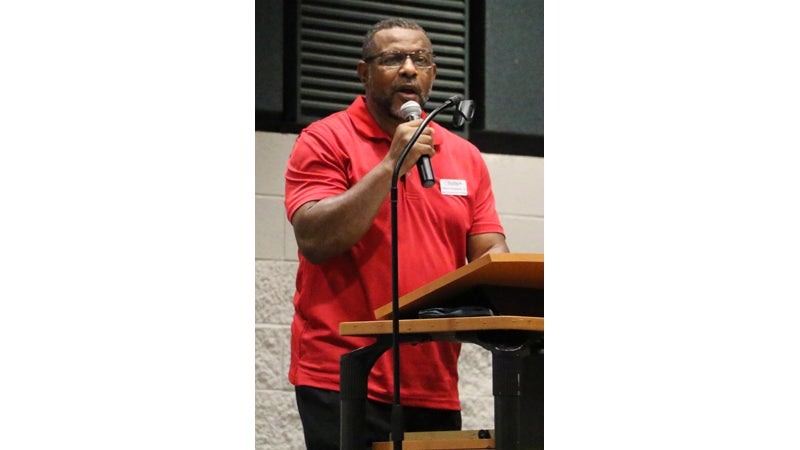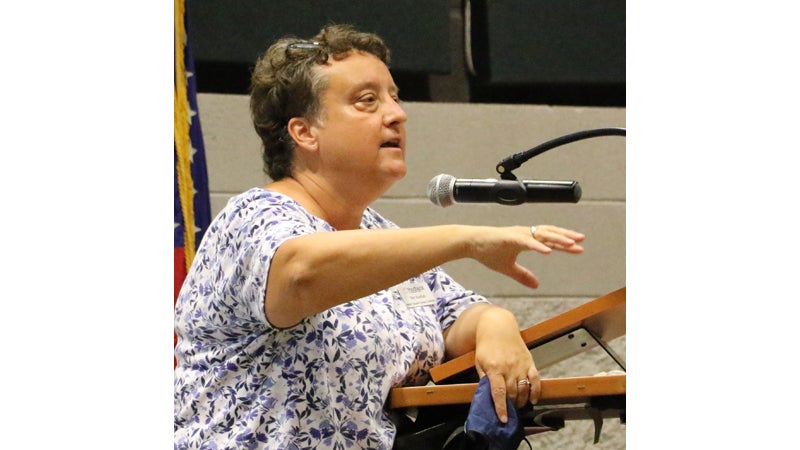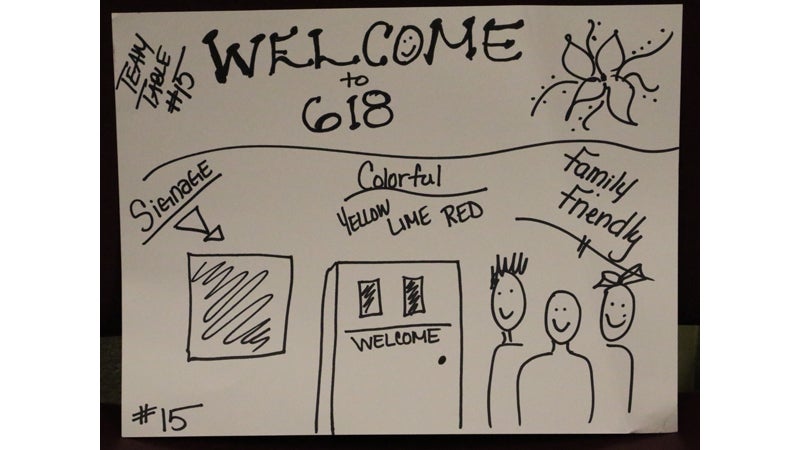Foodbank gathers community ideas for produce hub
Published 6:20 pm Wednesday, September 15, 2021
|
Getting your Trinity Audio player ready...
|
The Foodbank of Southeastern Virginia and the Eastern Shore held a Community J.A.M. Session — or Joint Action Meeting — on Aug. 28 at Camp Community College’s Workforce Development Center with the goal of finding out what the community would like to see happen at 618 South St. in Franklin.
That is the address of the Foodbank’s Western Tidewater Community Produce Hub, which is expected to open in 2022.
Cliff Hedgspeth, the Western Tidewater Branch manager for Foodbank, detailed the purpose of the J.A.M. Session to the community members and elected officials present Aug. 28.
“Many of you have heard and many of you know that in 2019, in order to address food insecurity for neighbors in Western Tidewater, the Obici Healthcare Foundation provided a three-year $300,000 grant for the Foodbank to scale and sustain programs in Western Tidewater,” he said. “This initiative included establishing a Western Tidewater Community Produce Hub, which also serves as the Foodbank of Southeastern Virginia and the Eastern Shore Western Tidewater Branch.
“Now the building that we’re putting up is actually a food bank, but we are kind of morphing into a brand new model,” he continued. “It’s not going to be just a food bank where people store food and distribute, but we are getting ready to renovate a two-story building.”
He explained that the first floor of the building at 618 South St. is dedicated to housing a cafe, a commercial kitchen, a marketplace and a warehouse.
“And the reason why you’re here — we want to talk about the second floor,” he said Aug. 28. “We want to hear your ideas of what’s going to happen on the second floor. What kind of things do you want to see come to the second floor? Because we’re calling it a hub, it’s not just for food, but this is a place where we can have food-plus programs. We’re going to give food plus whatever you need.”
He said, “We want to hear a conversation as to what you would like to see happen at 618.”
Those in attendance at the J.A.M. session were treated to a special dance presentation highlighting nutrition, health and fitness. Following this were two speakers who shared their inspiring stories of overcoming adversity, highlighting home ownership and healthy living.
Shortly thereafter, J.A.M. session participants engaged in small group discussions to come up with answers, written on a large collection of Post-it notes, to the following questions:
1.) What resources, programs and services do you want to see happen at 618? What would make you come to this facility? What do we need to have here to serve you?
2.) What challenges do you want us to know about? What barriers do we need to be aware of as we develop this Community Hub?
3.) When you walk in the building, what does the space feel/look like?
At the conclusion of the small group discussions, Western Tidewater Regional Outreach Coordinator II Teri Zurfluh asked for examples of great ideas that came out of the activity.
Calvin Carter, who teaches music at S.P. Morton Elementary School, shared his idea, noting that some of his students have expressed an interest in music composition. He indicated that the focus of their interest is outside the realm of his curriculum in school, but if he had a space that he and the students could meet once or twice a month outside of school time — perhaps a space on the second floor at 618 South St. — he could help them learn music composition, tailoring the lessons to their specific interests.
He said this would create an avenue of expectancy. These elementary school students could take their knowledge to middle school and the middle school band and be able to provide creative input to the band director, thus enabling student involvement in education.
Foodbank President and CEO Dr. Ruth Jones Nichols provided a brief overview of community members’ responses to the questions, first addressing the questions associated with No. 1.
“As I walked around, I really liked the fact that so many of you were dreaming big, and you can see from all of the Post-it notes that there were a lot of ideas regarding what we should have at 618 South St. here in Franklin, Virginia,” she said. “When you talked about resources, programs and services that you wanted to see, there was a common theme — you want services for all people.
“And so as I looked at the Post-it notes, I saw seniors, I saw children, I saw people with disabilities, I saw individuals who are having mental health challenges, so the thought was that this should be a location that serves all people,” she continued.
She noted that small group participants also talked about education on many different levels.
“GED, on-site tutoring, cooking demonstrations, health and wellness, budgeting, finance, credit repair, you talked about basic reading programs,” Jones Nichols said.
She pointed out that community members talked about collaborations.
“So whether it was a day care center that would offer services to children and families or senior services or victim-of-violence services, you talked about a lot of services and collaboration that should take place there at 618,” she said.
She said participants talked about help for people dealing with substance abuse.
Next, Jones Nichols recognized Camp Community College Interim President Dr. Corey McCray, who was present for the event.
“Someone said they want Camp Community College on the second floor at 618,” Jones Nichols said. “So Dr. McCray, we’re looking forward to you and all of your team members making that happen.”
She said one of the Post-it notes referenced a career information center.
“Someone said we need a laundromat at 618,” she said. “We said dream big, right?”
She then specifically called on the attention of Franklin Mayor Frank M. Rabil and Franklin Ward 4 Councilman Dr. Linwood Johnson, who were present.
“I think there are some additional resources that we’d like to see on that side of town, whether they’re at 618 or in close proximity,” she said.
Mentioning other answers to the first questions posed, Jones Nichols highlighted arts and music, health and wellness, services that focus on employment and workforce development and financial literacy in terms of budgeting.
“So those are just some of the things that you talked about in terms of programs and services,” she said.
Then she shifted to sharing responses to the questions associated with No. 2.
“Now you also said there are going to be some barriers to accessing 618,” she said. “And one of the things that I saw a couple of times was just a lack of understanding about what might be there. So it’s one thing to say, ‘Workforce development is going to be there,’ but what does that really mean? So there may be a lack of understanding, which means we have to go above and beyond to communicate with our neighbors.
“You also talked about transportation as a barrier,” she continued. “We’ve heard over and over that some things are on one side of town, and so that may make it difficult for individuals to get to the other side of town. So transportation is something that we need to think about.”
She counted at least five times that people emphasized parking.
“You said parking might be a challenge, and so that’s something we want to take into consideration,” she said. “Parking and transportation are related to accessibility, so that’s something we want to keep in mind.
“This is a really basic one, but it’s a big one — the availability of volunteers,” she continued. “We want to create jobs in this space, but we are going to need some volunteers to keep things going.”
She noted that child care was brought up as a challenge.
“And then there were some other things that came up like skepticism, pride, knowledge, a sense of hopelessness and despair regarding whether or not the services there will actually make a difference,” she said.
One of the small groups pointed to advertising and public relations.
“We need to really make sure we do a good job of getting the word out about what’s there and how important those services are,” Jones Nichols said.
Then she shifted the focus to answers to question No. 3.
“Finally, when we talk about what it should look like, feel like, smell like, I love these pictures,” she said, referring to pictures participants drew, symbolizing or epitomizing what they hope to experience at 618 South St.
Jones Nichols drew attention to a drawing of a flower bouquet and asked what words it made people think of, gathering responses like life, wedding, beauty and scent.
Next she highlighted a picture including a family that is friendly, an instruction to add colors that resonate most with them and signage that will be noticeable by everyone there.
“And then some other folks said someone that greets you, smiling, helpful,” Jones Nichols said. “They’re beautiful but not too busy. They want earth tones for colors.”
She said folks want it to be clean, and others want it to have a meditation room, a mural, light music and words of affirmation that come from a local artist.
“You get the picture?” Jones Nichols asked, noting people want 618 South St. to be really engaging. “This is what came from your small group discussions.”
“Because this is a Joint Action Meeting, and we want to hear all perspectives about what it will take to move the needle in our community,” she later added, “we have four individuals that we have invited, and as opposed to them just talking, right, we’ve asked them to respond specifically to the things that you said were most important for this community. And these are not individuals that offer the end-all, be-all solutions. They’re just going to tell you a little bit about what their institutions offer.”
The individuals included Iris Lundy, from Sentara Healthcare, speaking on health; Trina Jones, Camp Community College’s dean of student affairs, speaking about higher education; Desiree Key, from Camp Community College’s workforce development program, talking about employment; and Brian Hedgepeth, from Bronco Federal Credit Union, talking about finances.
“So as we think about health care and higher education as well as financial literacy and things like budgeting, think about what they’re saying and some other organizations that may be in a position to offer similar services, because once this meeting is over, we’ll take all of the information, and we’ll start to think about the right partners to bring in to do the kinds of things that you said were most important for this community,” Jones Nichols said.


